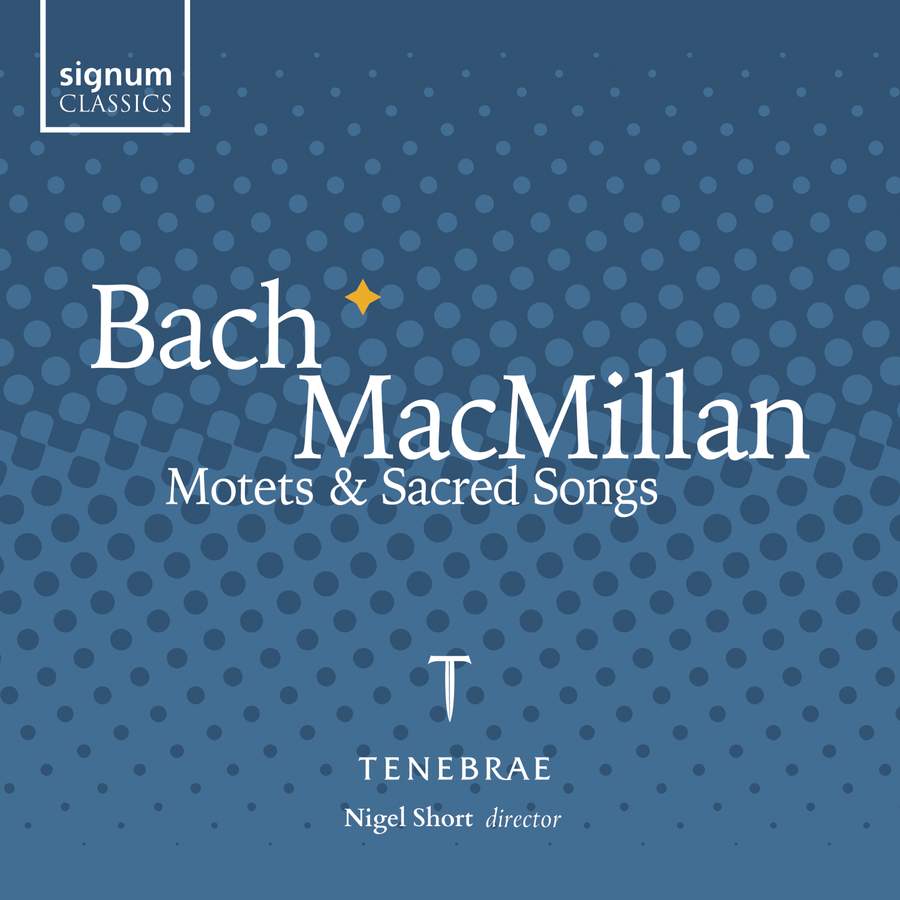JS BACH; MACMILLAN Motets and Sacred Songs
View record and artist detailsRecord and Artist Details
Genre:
Vocal
Label: Signum Classics
Magazine Review Date: AW23
Media Format: CD or Download
Media Runtime: 80
Mastering:
DDD
Catalogue Number: SIGCD773

Tracks:
| Composition | Artist Credit |
|---|---|
| (6) Motets, Movement: Jesu, meine Freude, BWV227 |
Johann Sebastian Bach, Composer
Nigel Short, Conductor Tenebrae |
| (6) Motets, Movement: Komm, Jesu, komm!, BWV229 |
Johann Sebastian Bach, Composer
Nigel Short, Conductor Tenebrae |
| (6) Motets, Movement: Singet dem Herrn ein neues Lied, BWV225 |
Johann Sebastian Bach, Composer
Nigel Short, Conductor Tenebrae |
| I saw Eternity the other night |
James MacMillan, Composer
Nigel Short, Conductor Tenebrae |
| Miserere |
James MacMillan, Composer
Nigel Short, Conductor Tenebrae |
| Tenebrae Responsories |
James MacMillan, Composer
Nigel Short, Conductor Tenebrae |
Author: Alexandra Coghlan
Singing Bach’s music, music director Nigel Short explains in his booklet essay, was one of his earliest – and happiest – musical memories as a boy chorister. But only now, 20 years after founding Tenebrae, has he finally recorded the composer’s motets with the group. Has it been worth the wait?
Yes and no. Perhaps 20 years of rumination has layered thoughts too densely for definitive choices, and Short has instead opted to capture the energy of a live performance – a sequence (recorded at Snape Maltings) that interleaves Bach’s Komm, Jesu, komm, Jesu, meine Freude and Singet dem Herrn with works by James MacMillan, including his Miserere and set of three Tenebrae Responsories: Lutheran piety meets Catholic anxiety and ecstasy.
It’s a monumental programme – a huge sing in terms of both brain and body. Short’s singers tackle it with all their signature precision. The demanding MacMillan Responsories in particular, with their stark sonic drama and mercurial shifts of texture, explode in the ear: all translucent vertical clarity and balance. The flickering ornaments in ‘Tenebrae factae sunt’ shoot like sparks around the choir, and the bladed purity of Short’s upper voices comes into its own in the gleaming exchanges of ‘Tradiderunt me’.
But this is straight singing taken to extremes, especially on the top line (and only in the final chord of Jesu, meine Freude do the unusually reticent low basses finally make their presence felt with some real resonance). It works brilliantly (the operative word) for a fleet-footed Singet, sopranos quicksilver fire above, never touching the ground, but it’s a different story for Komm, Jesu, komm. Reduced forces are beautifully tuned but the effect is bloodless, cold to the touch. The refusal to let the voices vibrate feels clipped, tense rather than pure, and that tension transmits right through a very careful account.
There’s plenty to admire here, but love? I’m not so sure.
Discover the world's largest classical music catalogue with Presto Music.

Gramophone Digital Club
- Digital Edition
- Digital Archive
- Reviews Database
- Full website access
From £8.75 / month
Subscribe
Gramophone Full Club
- Print Edition
- Digital Edition
- Digital Archive
- Reviews Database
- Full website access
From £11.00 / month
Subscribe
If you are a library, university or other organisation that would be interested in an institutional subscription to Gramophone please click here for further information.




